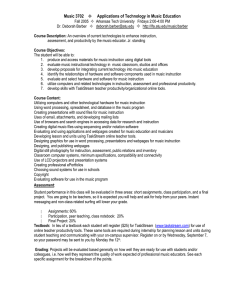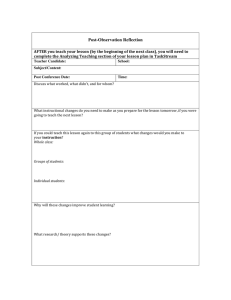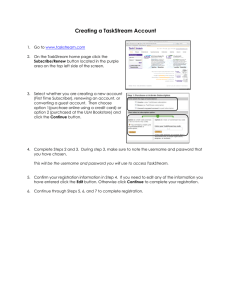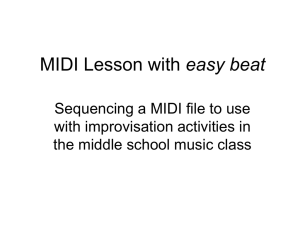Music 3702
advertisement
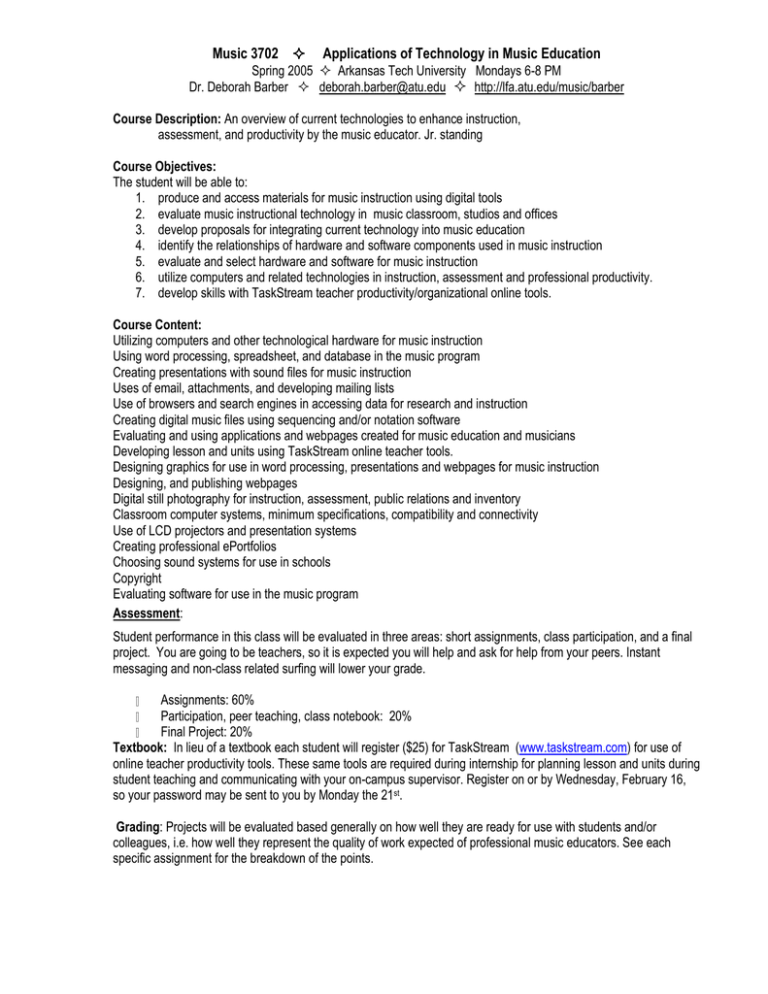
Music 3702 Applications of Technology in Music Education Spring 2005 Arkansas Tech University Mondays 6-8 PM Dr. Deborah Barber deborah.barber@atu.edu http://lfa.atu.edu/music/barber Course Description: An overview of current technologies to enhance instruction, assessment, and productivity by the music educator. Jr. standing Course Objectives: The student will be able to: 1. produce and access materials for music instruction using digital tools 2. evaluate music instructional technology in music classroom, studios and offices 3. develop proposals for integrating current technology into music education 4. identify the relationships of hardware and software components used in music instruction 5. evaluate and select hardware and software for music instruction 6. utilize computers and related technologies in instruction, assessment and professional productivity. 7. develop skills with TaskStream teacher productivity/organizational online tools. Course Content: Utilizing computers and other technological hardware for music instruction Using word processing, spreadsheet, and database in the music program Creating presentations with sound files for music instruction Uses of email, attachments, and developing mailing lists Use of browsers and search engines in accessing data for research and instruction Creating digital music files using sequencing and/or notation software Evaluating and using applications and webpages created for music education and musicians Developing lesson and units using TaskStream online teacher tools. Designing graphics for use in word processing, presentations and webpages for music instruction Designing, and publishing webpages Digital still photography for instruction, assessment, public relations and inventory Classroom computer systems, minimum specifications, compatibility and connectivity Use of LCD projectors and presentation systems Creating professional ePortfolios Choosing sound systems for use in schools Copyright Evaluating software for use in the music program Assessment: Student performance in this class will be evaluated in three areas: short assignments, class participation, and a final project. You are going to be teachers, so it is expected you will help and ask for help from your peers. Instant messaging and non-class related surfing will lower your grade. Assignments: 60% Participation, peer teaching, class notebook: 20% Final Project: 20% Textbook: In lieu of a textbook each student will register ($25) for TaskStream (www.taskstream.com) for use of online teacher productivity tools. These same tools are required during internship for planning lesson and units during student teaching and communicating with your on-campus supervisor. Register on or by Wednesday, February 16, so your password may be sent to you by Monday the 21st. Grading: Projects will be evaluated based generally on how well they are ready for use with students and/or colleagues, i.e. how well they represent the quality of work expected of professional music educators. See each specific assignment for the breakdown of the points. Projects: You will be given assignments in the form of projects that must be completed by an assigned due date. These vary in the amount of time required. Projects which are submitted late will be graded lower by 10% after one week. If project deadlines pose a serious problem for you, please communicate with me to discuss options. Final Project: The final project consists of two major components:1[3] an educational PowerPoint presentation that incorporates CD audio, digitized sound, MIDI resources, DVD, or some combination of several of these a web site that includes multiple hyperlinked pages, tables, MIDI sound, other sound files, images, and links to external web pages of interest to potential users Because the projects form such a substantial portion of the grade and will provide a tangible product resulting from your efforts, it will be important to elaborate further. Each of your projects – and a number of the assignments – should be related to a “Theme” you will pick early in the semester and upon which you expand as you progress in your general knowledge and technological skill level. Your final project should be the largest expansion – a culmination – of this Theme. Each student’s Final Project will be presented (or demonstrated) to the entire class during our Final Exam time period and will be in lieu of a Final Exam. [Topics for both the Midterm & Final Projects must be approved by Dr. Barber.] Upon completion of this course, it is my hope that each student will have developed the fundamental abilities necessary to be a self-sufficient learner of new technology … something that will serve you well for many years to come!! Prerequisites: an avid interest in teaching and in kids, readiness to learn from and assist others who have different skill levels or interests, willingness to learn independently and take initiative, willingness to undergo the practice and frustrations needed to learn software, and an openness to thinking about schools and music teaching/learning in new ways. Class periods: Class periods will include four types of activities: 1) presentations and demonstrations by the instructor, 2) guided practice with instructor leading software use by students, 3) individual hands-on practice and research, and 4) discussions. Lab times: You should expect to work in RPL or on your own computer during non-class times about 2-3 hours a week to complete projects and assignments. This is when your major skill development will occur. I recommend that you schedule this time into your calendar on a regular basis to make ongoing progress on projects. Purpose: This course is an introduction to the major technologies in use today by K-12 music educators and music students. It is intended to introduce you to the knowledge and skills you will need to apply technology as a music teacher in today's school programs. The course provides experience with the four major types of uses of technology by music teachers and students: 1. Administrative/Communication 2. Preparing Teaching Materials 3. Leading Class Activities 4. Student Uses of Technology Be kind and do your best.
